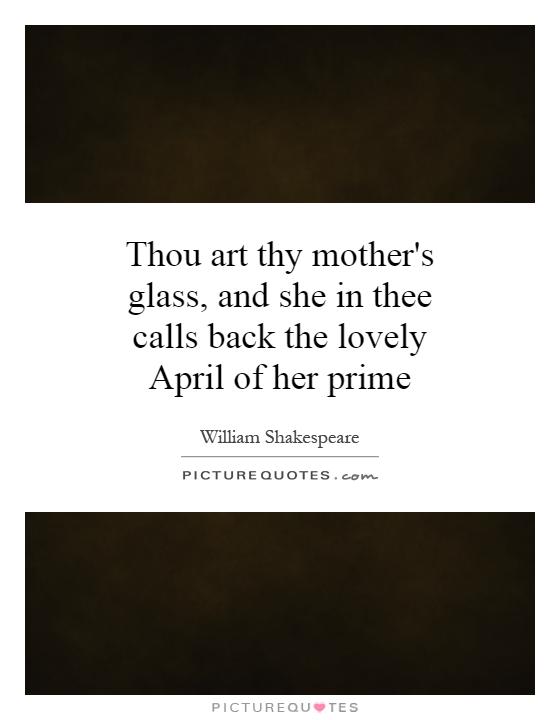Thou art thy mother's glass, and she in thee calls back the lovely April of her prime

Thou art thy mother's glass, and she in thee calls back the lovely April of her prime
The quote "Thou art thy mother's glass, and she in thee calls back the lovely April of her prime" is from William Shakespeare's play Sonnet 3. In this sonnet, the speaker is addressing a young man, urging him to marry and have children in order to preserve his beauty and youth. The speaker compares the young man to a mirror, reflecting the beauty of his mother and bringing back memories of her own youthful days.The use of the word "glass" in this context is significant, as it suggests that the young man is a reflection of his mother, both physically and spiritually. The idea that the mother sees herself in her son is a powerful one, as it speaks to the deep connection between parent and child. The son is not just a separate individual, but a continuation of his mother's own life and experiences.
The mention of "the lovely April of her prime" further emphasizes the idea of youth and beauty. April is often associated with spring, a time of renewal and growth. By calling back the April of her prime, the speaker is suggesting that the mother sees in her son a reminder of her own youthful days, filled with hope and promise.
This quote also speaks to the cyclical nature of life, as the mother sees in her son a reflection of her own past and a glimpse of the future. The son, in turn, will one day become a parent himself, passing on his own traits and characteristics to his children. In this way, the beauty and youth of one generation are preserved and carried forward to the next.
Overall, this quote from Shakespeare's Sonnet 3 is a poignant reminder of the bond between parent and child, and the ways in which we are shaped by our family history. It speaks to the timeless themes of love, beauty, and the passage of time that are central to much of Shakespeare's work.












 Friendship Quotes
Friendship Quotes Love Quotes
Love Quotes Life Quotes
Life Quotes Funny Quotes
Funny Quotes Motivational Quotes
Motivational Quotes Inspirational Quotes
Inspirational Quotes